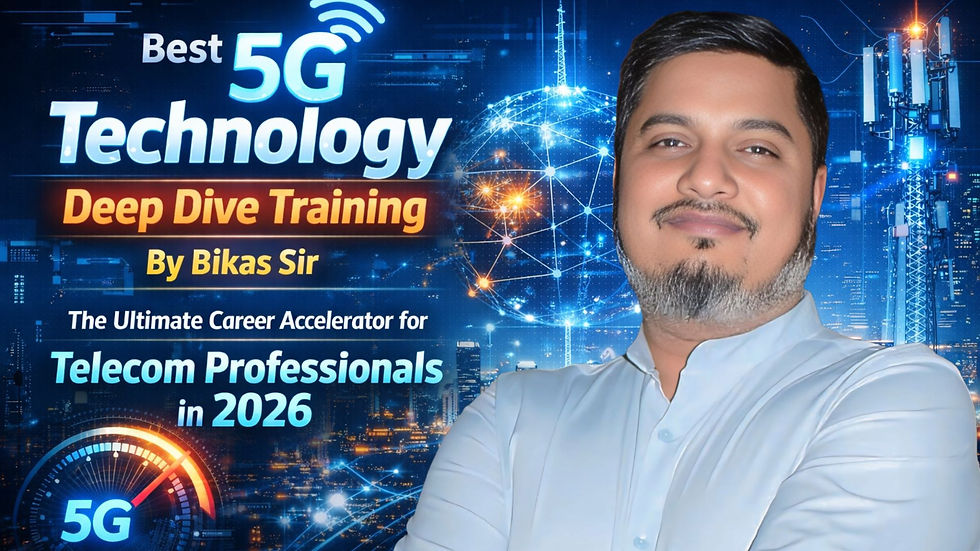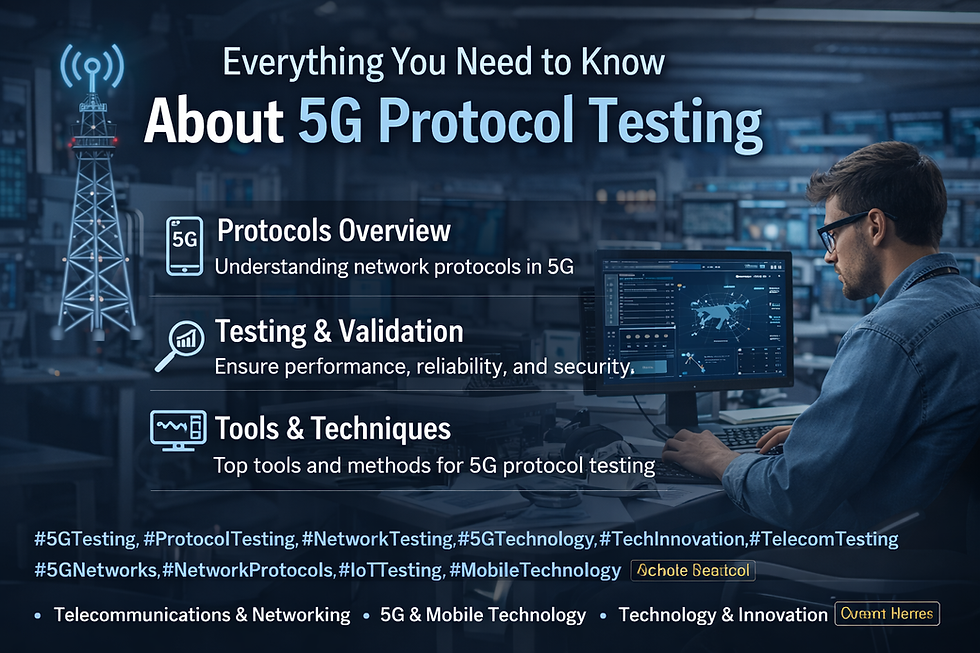The Role of 5G Telco Cloud in Smart Retail Solutions in 2024
- Sameer Krishn
- Jun 25, 2024
- 5 min read
Updated: Jun 28, 2024

Introduction
As the retail landscape continues to evolve, technology plays a crucial role in shaping consumer experiences and operational efficiencies. The advent of 5G technology, coupled with telco cloud capabilities, is poised to revolutionize the retail sector. 5G Telco Cloud offers unprecedented speed, low latency, and high connectivity, enabling a new era of smart retail solutions. This blog explores the transformative impact of 5G Telco Cloud on the retail industry, delving into its applications, benefits, challenges, and future trends.
Table of Contents
Understanding 5G Telco Cloud
Evolution of Smart Retail Solutions
Applications of 5G Telco Cloud in Smart Retail
Benefits of 5G Telco Cloud for Retailers
Challenges and Considerations
Future Trends in Smart Retail with 5G Telco Cloud
Conclusion
Understanding 5G Telco Cloud
5G technology represents the fifth generation of mobile networks, delivering faster speeds, lower latency, and greater connectivity than its predecessors. The telco cloud, on the other hand, leverages cloud computing principles within the telecommunications domain, providing scalable and flexible network services. Together, 5G and telco cloud technologies offer a robust infrastructure that supports a wide range of applications, from real-time analytics to immersive customer experiences.
Key Features of 5G Telco Cloud
High Speed and Low Latency: 5G networks provide ultra-fast data transfer rates and minimal delay, enabling real-time interactions and services.
Massive Connectivity: The ability to connect a vast number of devices simultaneously, crucial for the Internet of Things (IoT) in retail environments.
Scalability and Flexibility: Telco cloud platforms offer scalable solutions that can adjust to varying demands, ensuring efficient resource utilization.
Enhanced Security: Advanced security features protect data and transactions, ensuring privacy and compliance with regulations.
Understanding these features is essential for comprehending how 5G Telco Cloud can transform the retail sector.
Evolution of Smart Retail Solutions
The retail industry has witnessed significant technological advancements over the years, evolving from traditional brick-and-mortar stores to sophisticated smart retail environments. Key milestones in this evolution include:
1. Digital Transformation
The introduction of digital technologies, such as e-commerce platforms and mobile apps, has reshaped how consumers shop and interact with brands.
2. IoT Integration
The integration of IoT devices, such as smart shelves and RFID tags, has enhanced inventory management, supply chain efficiency, and customer engagement.
3. Data-Driven Insights
Retailers have increasingly relied on data analytics to gain insights into consumer behavior, optimize operations, and personalize marketing strategies.
4. Omnichannel Retailing
The seamless integration of online and offline channels has become essential for providing a cohesive shopping experience.
5. AR and VR Experiences
Augmented Reality (AR) and Virtual Reality (VR) technologies have introduced immersive shopping experiences, allowing customers to visualize products in real-life settings.
As the retail industry continues to evolve, 5G Telco Cloud is set to drive the next wave of innovation, enabling smarter and more efficient retail solutions.
Applications of 5G Telco Cloud in Smart Retail
The integration of 5G Telco Cloud into the retail sector offers numerous applications that enhance both operational efficiency and customer experience. Here are some key applications:
1. Real-Time Inventory Management
5G-enabled IoT devices provide real-time data on inventory levels, reducing the risk of stockouts and overstock situations. Retailers can optimize their supply chain and ensure product availability.
2. Personalized Customer Experiences
With 5G, retailers can leverage advanced analytics and AI to deliver personalized recommendations and promotions based on real-time customer data, enhancing the shopping experience.
3. Enhanced In-Store Navigation
5G-powered AR applications can guide customers to specific products within the store, improving their shopping efficiency and satisfaction.
4. Smart Checkout Systems
5G technology enables seamless, contactless checkout experiences through mobile payment systems and smart kiosks, reducing wait times and enhancing convenience.
5. Remote Assistance and Support
Retailers can offer real-time remote assistance through video calls and AR, providing customers with expert advice and support without the need for physical presence.
6. Advanced Security Systems
5G-powered surveillance cameras and sensors enhance store security, providing real-time monitoring and quick response to potential threats.
7. Predictive Maintenance
IoT devices connected via 5G can monitor the condition of equipment and infrastructure, predicting maintenance needs and preventing breakdowns.
Benefits of 5G Telco Cloud for Retailers
The adoption of 5G Telco Cloud in the retail sector offers several significant benefits:
1. Improved Customer Satisfaction
Personalized experiences, efficient in-store navigation, and seamless checkout processes enhance customer satisfaction and loyalty.
2. Operational Efficiency
Real-time data and predictive analytics enable retailers to optimize inventory management, reduce operational costs, and improve supply chain efficiency.
3. Increased Sales and Revenue
Enhanced customer experiences and personalized marketing strategies drive higher conversion rates and increased sales.
4. Competitive Advantage
Retailers that leverage 5G Telco Cloud technology can differentiate themselves from competitors by offering innovative and efficient shopping experiences.
5. Enhanced Security and Compliance
Advanced security features protect customer data and ensure compliance with regulatory requirements, building trust and credibility.
6. Flexibility and Scalability
Telco cloud platforms provide scalable solutions that can adapt to changing demands, allowing retailers to expand their operations without significant infrastructure investments.
Challenges and Considerations
Despite its numerous benefits, the integration of 5G Telco Cloud into retail environments comes with challenges and considerations:
1. Infrastructure Investment
Implementing 5G infrastructure requires significant investment in new equipment and technology. Retailers must carefully assess the cost-benefit ratio and plan their budgets accordingly.
2. Data Security and Privacy
With the increased connectivity and data exchange enabled by 5G, ensuring the security and privacy of sensitive customer information is paramount. Robust cybersecurity measures must be implemented to protect against potential threats.
3. Interoperability
Ensuring interoperability between different systems and devices from multiple vendors is essential for seamless integration. Industry-wide standards and protocols can help facilitate interoperability.
4. Regulatory Compliance
Retailers must navigate complex regulatory frameworks related to data privacy, security, and telecommunications. Compliance with these regulations is crucial to avoid legal issues and penalties.
5. Skill and Workforce Development
Adopting 5G Telco Cloud technology requires retailers to develop new skills and expertise among their workforce. Training programs and professional development initiatives are essential to equip personnel with the necessary knowledge and skills.
Future Trends in Smart Retail with 5G Telco Cloud
Looking ahead, several trends are expected to shape the future of smart retail with 5G Telco Cloud technology:
1. AI and Machine Learning Integration
The convergence of 5G Telco Cloud with AI and machine learning technologies will enable more sophisticated data analytics, predictive modeling, and personalized customer experiences.
2. Blockchain for Supply Chain Transparency
Blockchain technology offers decentralized and transparent record-keeping capabilities, making it suitable for managing supply chain transactions. Integrating blockchain with 5G Telco Cloud enables secure and tamper-resistant transactions.
3. Enhanced Augmented Reality (AR) and Virtual Reality (VR)
5G’s low latency and high-speed connectivity will drive the adoption of more immersive AR and VR applications in retail, providing customers with enhanced shopping experiences.
4. Smart Shelves and Automated Inventory Management
IoT-enabled smart shelves, connected via 5G, will provide real-time inventory data, enabling automated reordering and reducing manual intervention.
5. Personalized Marketing and Loyalty Programs
Advanced analytics and real-time data will enable retailers to deliver highly personalized marketing campaigns and loyalty programs, driving customer engagement and retention.
6. Sustainable Retail Practices
5G Telco Cloud technology can support sustainable retail practices by optimizing energy consumption, reducing waste, and enabling more efficient supply chain management.
Conclusion
The integration of 5G Telco Cloud technology into the retail sector is set to revolutionize the way retailers operate and interact with customers. By enabling real-time data exchange, personalized experiences, and advanced security features, 5G Telco Cloud offers numerous benefits that enhance operational efficiency and customer satisfaction. However, retailers must navigate challenges such as infrastructure investment, data security, and regulatory compliance to fully realize the potential of this transformative technology. As the retail industry continues to evolve, the adoption of 5G Telco Cloud will play a critical role in shaping the future of smart retail solutions.
Internal URLs:
Apeksha Telecom's training programs: https://www.apekshatelecom.com/training
Apeksha Telecom's placement assistance: https://www.apekshatelecom.com/placement-assistance
External URLs:
Telecom Gurukul: https://www.telecomgurukul.com
Reference URLs:
"The Role of 5G Telco Cloud in Smart Retail Solutions" - Apeksha Telecom: https://www.telecomgurukul.com/post/the-role-of-5g-telco-cloud-in-smart-retail-solutions




Comments